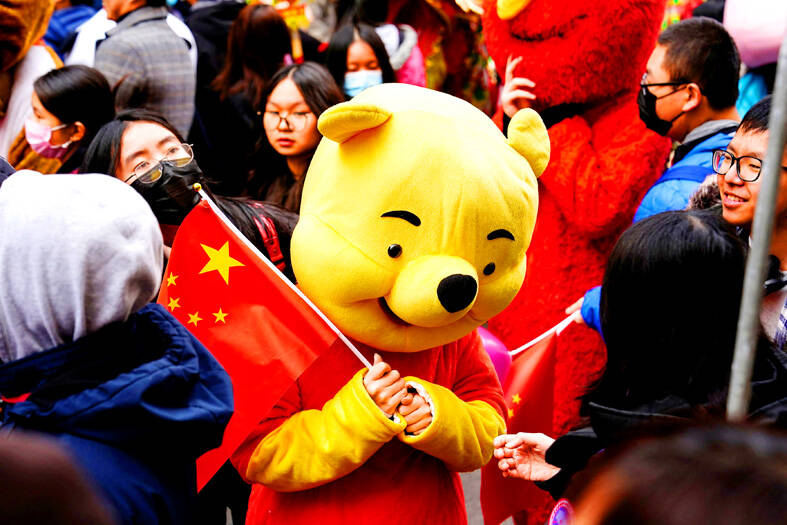China continued to repress religious freedom by destroying places of worship and detaining clergy in the first six months of the year, the Mainland Affairs Council said in a report.
Chinese officials closed down the Jokhang Temple, one of the holiest sites of Tibetan Buddhism, from March 8 to March 11, a date seemingly chosen to coincide with the anniversary of the Tibetan National Uprising Day on March 10, the council said.
Beijing has been carrying out deliberate attacks on organized religion with arrests and other means, it said, adding that religious leaders and followers were detained in tens of recorded incidents.

Photo: Reuters
In April, a Tibetan teacher was arrested after criticizing Beijing’s video propaganda targeting the Dalai Lama, it said.
Father Xie Tianming (謝天鳴), a Catholic priest leading an underground church in Hebei, was arrested and sentenced to political re-education, while six members of a familial congregation in Guandong were arrested for taking part in religion illegally, the council said.
Also in Guangdong, public security agents broke into a private residence and arrested more than 30 evangelicals who were streaming a religious video, it said.
Early this year, a large force of riot police in Zhejiang Province demolished a Presbyterian church under the pretext of facilitating the construction of a commercial building, the council said.
A dormitory of the Catholic Church in Shanxi Province was forcibly demolished in February, and three months later there were clashes in Yunnan Province between the police and local Muslims over the government’s plan to destroy a mosque, it said.
Beijing continued to contravene the freedom of speech, the council said, citing the forced disappearance of Xinjiang-based Kazakh human rights activist Zhanargul Zhumatai after she accepted an interview request by The Associated Press, the council said.
China banned the UK-produced comedy horror film Winnie the Pooh: Blood and Honey from theaters, despite its being entirely irrelevant to Chinese politics, it said.
Comedian Lee Haoshi (李昊石) was blacklisted and his company was fined 13 million yuan for producing a skit about the Chinese People’s Liberation Army, it said, adding that Chinese social media posts about the Tiananmen Massacre by foreign embassies were deleted from the platform.
Chinese President Xi Jinping (習近平) has ratcheted up repression after obtaining a third term as president at the 20th National Congress of the Chinese Communist Party in October last year, an official familiar with the matter said, speaking on condition of anonymity.
Li Yanhe (李延賀), the editor-in-chief of Taiwan-based Gusa Press (八旗文化), was arrested in April on suspicion of national security crimes while visiting family in China, where he remains in detention, they said.
Beijing’s new anti-espionage law — which greatly broadened the definition of spying and took effect last month — has triggered an exodus of foreign enterprises from China, they said.
Taiwanese academics invited to attend conferences in China were detained for hours and had their personal devices confiscated by Chinese border officials, they said, adding that religious figures were not exempt from this treatment.
People bringing in more copies of the Bible than allowed can be prosecuted under Chinese laws, he said.
Xi rules by ideology and the security of his regime is based on the use of surveillance and stabilization, which gives China’s national security apparatuses authority far greater than the offices in charge of Taiwan affairs, they said, adding that this means Taiwanese invited by the Taiwan Affairs Office or provincial “united front” organizations cannot count on their host for protection if they are detained by state security agencies, he said.

Hong Kong-based American singer-songwriter Khalil Fong (方大同) has passed away at the age of 41, Fong’s record label confirmed yesterday. “With unwavering optimism in the face of a relentless illness for five years, Khalil Fong gently and gracefully bid farewell to this world on the morning of February 21, 2025, stepping into the next realm of existence to carry forward his purpose and dreams,” Fu Music wrote on the company’s official Facebook page. “The music and graphic novels he gifted to the world remain an eternal testament to his luminous spirit, a timeless treasure for generations to come,” it said. Although Fong’s

China’s military buildup in the southern portion of the first island chain poses a serious threat to Taiwan’s liquefied natural gas (LNG) supply, a defense analyst warned. Writing in a bulletin on the National Defense and Security Research’s Web site on Thursday, Huang Tsung-ting (黃宗鼎) said that China might choke off Taiwan’s energy supply without it. Beginning last year, China entrenched its position in the southern region of the first island chain, often with Russia’s active support, he said. In May of the same year, a Chinese People’s Liberation Army Navy (PLAN) force consisting of a Type 054A destroyer, Type 055 destroyer,

Actor Darren Wang (王大陸) was questioned by prosecutors for allegedly orchestrating an attack on a taxi driver after he was allegedly driven on a longer than necessary route in a car he disliked. The questioning at the New Taipei City District Prosecutors’ Office was ongoing as of press time last night. Police have recommended charges of attempted murder. The legally embattled actor — known for his role in the coming-of-age film Our Times (我的少女時代) — is under a separate investigation for allegedly using fake medical documents to evade mandatory military service. According to local media reports, police said Wang earlier last year ordered a

Taiwan is planning to expand the use of artificial intelligence (AI)-based X-ray imaging to customs clearance points over the next four years to curb the smuggling of contraband, a Customs Administration official said. The official on condition of anonymity said the plan would cover meat products, e-cigarettes and heated tobacco products, large bundles of banknotes and certain agricultural produce. Taiwan began using AI image recognition systems in July 2021. This year, generative AI — a subset of AI which uses generative models to produce data — would be used to train AI models to produce realistic X-ray images of contraband, the official